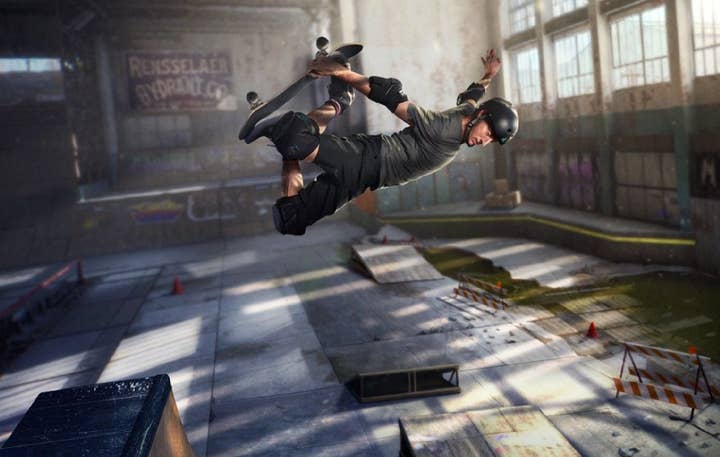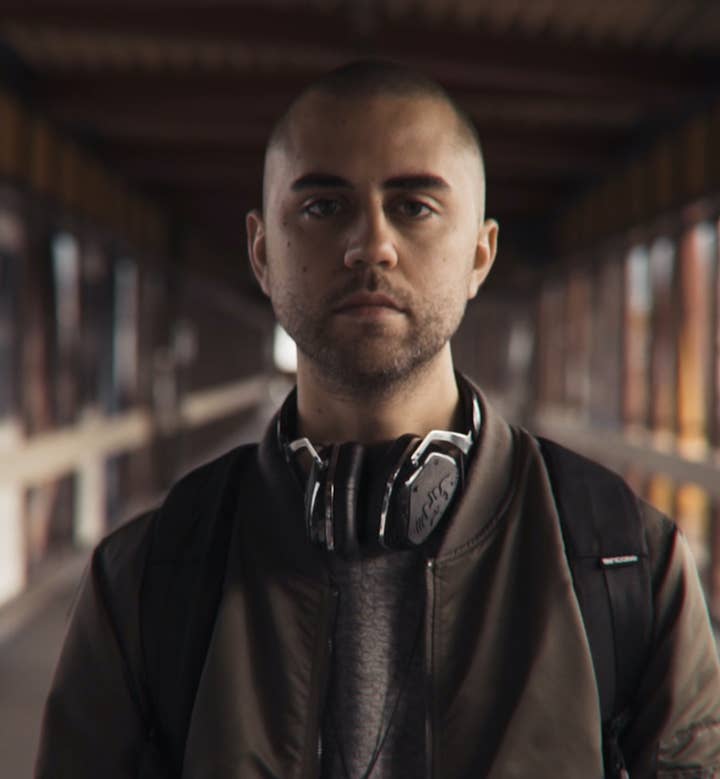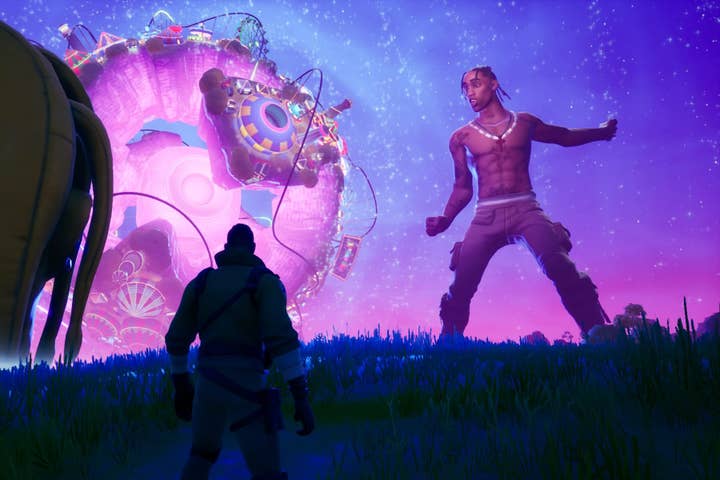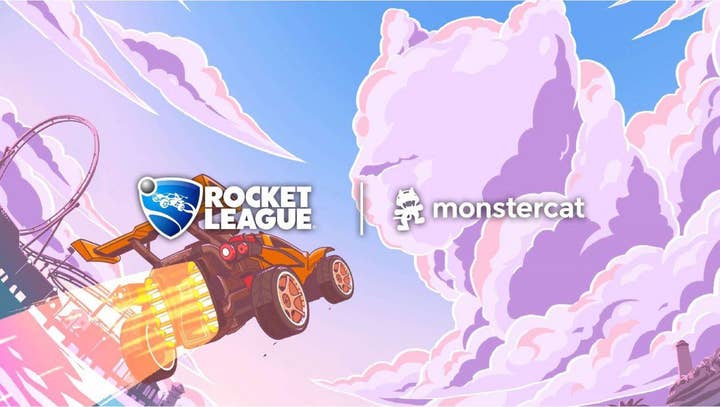Music licensing in games: trials, tribulations, and what's next
Experts in music licensing reveal their biggest challenges, advice for publishers big and small, and what they expect from the future of music in games
The games and music industries have had a long and at times illustrious relationship. Early 80s arcade titles like Journey set the tone early, but licensed music came into its own in the 90s and 00s with titles like Tony Hawk's Pro Skater, Wip3out, Crazy Taxi, Guitar Hero, and licensed sports titles.
Today, licensed music is still a major part of the games market, but the relationship is far more multifaceted due to evolving market trends.
"We have gone from primarily background use in many classic titles to deeply integrated features such as in-game radio stations, artist skins with music stems built into abilities, rhythm games, and in-game concerts," says Gavin Johnson, head of gaming at Monstercat, an electronic music label known for its partnership with Rocket League.
How does music licensing work at big game publishers?
Music licensing in games is essentially a web of negotiation, approval, and bureaucracy.
Lori Cromwell-Charron, EA's senior associate for music licensing, outlines the process of how big game publishers obtain a synchronization license, which is essentially an agreement between a music user and the owner of a copyrighted composition that grants permission to release the song in a video format -- in this case, a game.
"Labels and publishing folks get approval from their artists or writers for a sync use," she says. "Then, music licensors like me negotiate and obtain approvals from the rights holders and administrators on fees and terms.'
"Next, music supervisors get approval from game production on the creative direction for the music. And that's all before multiple rounds of license negotiations."
Music licensors are well-versed in staying on top of all these layers of approvals, but the various legal obligations and negotiations mean the whole process can be time-consuming and confusing for laypeople and inexperienced game makers.
Like many relationships, the bond between games and music has seen honeymoon periods and growing pains.

Music licensing in games is complex and challenging
Over the years, many publishers have been forced to remove their games from storefronts due to issues with music licensing.
Remedy's Alan Wake had to be removed from sale on PC and consoles. It took the company almost a year and a half to renegotiate the music rights and return to stores.
Meanwhile, SEGA's Alpha Protocol was taken off Steam in 2019 for the same reason. At the time of writing, the Obsidian-developed RPG remains absent from PC gaming's biggest digital store.
GTA: Vice City was pulled off Steam in 2012 due to licensing issues for Michael Jackson's Wanna be Startin' Somethin'. The game returned to Steam shortly after with the problematic track removed.

Licensed music is a key part of the nostalgia for retro titles like Vice City and the early Tony Hawk games. Remasters, releases, and remakes remain a key trend in AAA gaming. Their unique selling proposition is nostalgia, so securing the right music licenses is necessary.
Justin Joyner was the audio lead for Vicarious Visions when the company was working on Tony Hawk's Pro Skater 1+2 (before the studio was merged into Blizzard). Joyner explains that securing music licenses for remakes is no small feat.
"Rights holders have changed hands over the years and, in many cases, multiple rights holders exist for a single track, so there are potentially many hoops to jump through just for a single track," he says.
Alex Tarrand, the co-founder of Styngr, also expresses how complicated music licensing in games can be. His company streamlines the music licensing process for game developers and publishers of all sizes.
"The complexity lies in the structure of how music licensing works today," he explains. "A single song can have multiple entities that represent the performers, the writers, and composers. The rights can vary across countries and geographies, and they can be completely different depending on how the music is used."
Some of the biggest challenges in music licensing for games
Licensing music in games brings about many challenges, but the three below are perhaps the most common:
The copyright for songs and recordings are separate. Publishers looking to secure the rights to a song need both the song license and the recording. This is why the early Guitar Hero games featured covers of some iconic songs; the publisher only needed a license for the song, not the recording.
Song rights can also be co-owned -- meaning all the owners need to agree to the license, making renegotiation a more difficult process.
Copyright laws differ by country, making the licensing process more challenging in an increasingly globalized world and games market.
Music licensing professionals and audio leads at game companies face these issues frequently, but some genres are tougher than others. Styngr's Alex Tarrand explains that licensing rap and hip-hop music in games often includes all of the above challenges.
"You'll have an artist who's performing it and you'll potentially have ten writers or ten composers associated with the song, and each one of those writers and composers could be signed to different entitles, and their rights can be different country to country," he says.
"In many cases, multiple rights holders exist for a single track, so there are potentially many hoops to jump through just for a single track"Justin Joyner
"While you may have the rights to the artist who's composing it, if you're trying to use that song in the Netherlands for example, those ten different writers, composers, and [other] people who contributed all have to be cleared on a per-region basis."
Licensing a large music library for a game can be a daunting task, one that requires managing relationships and keeping multiple parties happy.
"Across all these spaces, you're still researching rights holders, determining splits, tracking down clearances from sometimes elusive artists all while making sure everyone agrees on the best terms," says EA's Cromwell-Charron.
"When creating an interesting musical landscape to cover that much time, you end up licensing anywhere from 40 to 100 or more tracks with at least two -- but sometimes six or more -- rights holders per track. Getting a wish list of this size cleared on time and within budget is definitely a challenge, but it's one that I enjoy."
Therefore, working with trusted labels and publishing partners -- and keeping good relationships with them -- is crucial for talent working on music licensing at large publishers.
The situation was always complicated, but things are only getting more complex as technology and consumer engagement evolve. Aggravating things further, gaming is a particularly fast-moving market, especially compared to music licensing laws that were written decades ago.

The digital age has only complicated things further
When publishers make a song part of an online game, they are not only copying the song (using it for the content) but also communicating the song (distributing it). Copying and communicating require separate licenses, adding another layer of challenge.
"I think the age of the internet has made music licensing much more complicated as there are many ways to consume music," says Joyner.
"Given games are mainly downloaded today as opposed to purchased [on] a physical disc or cartridge in a store, and games are connected to the internet for updates, it raises more questions for music in the games."
The role of games as social spaces has also evolved, sped up by the pandemic's stay-at-home orders and the unavoidable metaverse trend.
"Gaming engines today provide the development tools for virtually full creative freedom of music experiences in game, sometimes offering more than can be experienced in real life, unlocking a host of licensing variables such as in-game radios, emotes, and concerts," says Monstercat's Johnson.
"While these allow for highly immersive experiences and ways to monetize such as microtransactions and downloadable content, they also pose creative limitations from parties that have an interest in the rights of the records you are trying to license."

During the pandemic period, Fortnite has been a trailblazer for licensed music in games, thanks to its in-game concerts, music emotes, and diegetic in-game radio. However, the company has faced some copyright-related challenges of its own.
Still, Epic's flourishing relationship with music and the metaverse likely had a hand in its recent Bandcamp and Harmonix acquisitions. Epic clearly sees more potential for music in games, and personalization and social aspects are at the forefront. Epic's enthusiasm echoes among experts in the game music-licensing space.
"Games like Fortnite already allow you to assign a song to your avatar [via emotes]; there's a lot of opportunities there, and I think games will be able to monetize this as well," says Tarrand.
Yet, the music industry and its legacy licensing practices need to evolve to fully leverage gaming's potential. This underlines perhaps the biggest test for music licensors: keeping things fresh while working within an outdated framework.
"The challenge for music licensors is to work within our legacy framework to find solutions that allow production teams and creative teams to implement all the new and innovative ways they come up with to incorporate music into our games," says Cromwell-Charron.
"How do you deliver fresh content throughout a game's increasingly long lifecycle? How do you treat collaborative sessions where artists and players create music together within the live gaming space. How do you allow an artist to move from the gaming space to the internet broadcast space to the live performance space while having her music seamlessly move with her? We don't want to stifle creativity because the current licensing process hasn't yet caught up so we also have to get creative with our licensing partners."
While there's a long way to go, Johnson is hopeful that new metaverse opportunities will modernize the way music is licensed in games.
"I'm looking forward to a new generation of games that are always-online, updating, and expanding life cycles through new mediums such as web3 and game subscriptions that will make gaming more accessible," he says. "It should open up the door for more standardized, broad licensing scenarios that will bring demand for artists and catalogs of all sizes to be integrated and discovered."

The situation is already improving for bigger publishers
Many contracts now allow music to be covered for new platforms, which makes sense in the current games market, in which backward compatibility, remasters, remakes, and re-releases are a major part.
Some music licenses even ensure that games can retain tracks forever. These are called perpetuity licenses, and they're becoming easier to get for companies with a lot of leverage.
"It's all contingent on the opportunity the publisher is presenting to the artist in exchange for the use," says Johnson. "We consider factors such as an engaged player base, expected life cycle of the game, long-term discoverability of the music or artist in-game, and how impactful the music experience or use is itself, when justifying perpetual use of music in-game."
Luckily, getting a perpetuity license isn't completely out of the picture for smaller developers, yet it might be too optimistic for small companies to expect forever licenses for some of the biggest tracks.

"There are many types of rights holders out there who are ready to do business with smaller game publishers, from small independent music publishers and labels ,to majors with a significant market share or music libraries, with large catalogs and flexible rights and pricing," says Cromwell-Charron.
"Some music owners even focus specifically on the unique needs of those in the gaming sector. With this much diversity, you are bound to have rights holders who are open to having their music permanently associated with a great video game product."
Nevertheless, securing perpetuity licenses from the biggest artists requires a lot of time and resources.
"It's not impossible [to get a perpetuity license], but it can be time-consuming," says Styngr's Tarrand. "It can potentially require specialized counsel or consultants if you don't have that competency in house. And that involves an upfront price tag."
Fortunately, many big publishers have the capital for internal or external music licensing talent. EA's Cromwell-Charron argues that such advisors can offset many of the challenges associated with navigating the confusing space.
"If the goal is gaming-as-a-service and you need the music to follow, you approach the negotiations with that goal in mind. Do you anticipate renewal costs in your initial budget? Consider buyouts? Work with flexible rights holders? Some combination of all these? Working with someone who specializes in music licensing can help navigate these issues."
Sports titles often have a large catalog of licensed music, so game companies that publish sports games every year benefit from a well-oiled internal music licensing team.
"You can get an assembly line of hired talent and a process inside of your studio -- professionals who will do those clearances on the spot," says Tarrand. "An example there -- I'd imagine -- is NBA 2K. They have a team around them; they figured that out, and they're crushing through it."
Music licensing has also improved for smaller game makers
While smaller game companies have more options for getting licensed music into their games than ever, due diligence is essential. Asking for forgiveness instead of permission is not an option, but there are plenty of other options.
"There are real consequences to improperly using music that someone else owns, but you don't need a full-time music licensing team to secure music rights," says Cromwell-Charron.
It helps to build relationships and get the licensing ball rolling early. The process can be long, so getting started on licensing a month before release is not viable.

"I would recommend scoping out your music use, partners, and licenses before going too deep into development," says Monstercat's Johnson.
"It can be incredibly beneficial to find a music partner with a label or rights holders that are willing to grow with you throughout development so that you have a mutually built collaboration with managed costs and expectations from the ground up."
Not only did lockdown measures help pave the way for in-game concerts and social experiences, but they also led to more opportunities for small developers to secure licensed music. Musicians were unable to tour, so many smaller indie labels switched gears to synchronizing licenses to keep revenues up.
"Many have built out their catalog of pre-cleared music or one-stop options (where one entity can clear all rights) at interesting fees and with guaranteed indemnification," says Cromwell-Charron.
Several production houses and music libraries also offer huge libraries of tracks -- as do smaller companies who are seeking to partner with game companies. Monstercat and Stynger are both examples of such companies trying to democratize music licensing in games.
Smaller developers tend to forget their games can reach massive audiences, and these audiences can be extremely valuable for smaller labels.

What's in it for the artists?
Gaming has long been a way for people to discover new music. The number of players worldwide is growing each year -- now sitting at three billion strong, according to Newzoo. Gaming's reach is only growing.
"Monstercat's music is streamed millions of times per day in-game across all of our gaming partners, which provides a strong discovery lever for our music roster to be exposed to a global audience overnight," says Gavin Johnson. "Our long-term partnership with Rocket League over the past five years has produced over four billion streams across music platforms from artists of all sizes with songs in-game."
In-game concerts and events are only opening more opportunities, as showcased by Monstercat-signed artist Slushii.
"Many projects can be hindered creatively based on precedents that either party might not want to break"Gavin Johnson
"Slushii debuted the track during his Fortnite virtual concert in 2020, and it went on to become his most-streamed song in history (40+ million streams)," Johnson continues.
That said, there are now more avenues than ever before for consumers to discover new music. Back in the heyday of Tony Hawk's Pro Skater and Guitar Hero, places to discover music were few and far between. Not anymore.
"Now there's TikTok, and now there's all the DSPs like Spotify," said Tarrand. "You're painfully aware of what is hot and what is fresh. And I think games are going to have to catch up."
Can the relationship between music and games become more frictionless?
Going forward, collaboration and open communication between the publishers and licensors is crucial for successful music licensing in games. Each party has different goals, so finding a perfect middle ground is crucial.
"Many projects can be hindered creatively based on precedents that either party might not want to break," says Johnson. "This reduces the quality of the finished product in some cases. Music in games is a two-way street."
Technology is another avenue for progress, but the dated nature of music licensing may prove to be a barrier.
"There's a lot of talk about how technology can remove this friction -- everything from smart contracts to tokenizing ownership so rights holders are compensated for wherever their music is used (digitally)," says Cromwell-Charron.
"With so much legacy built into music licensing, I have a hard time seeing how this process becomes frictionless, but I'm sure people are working on it as we speak."
The pandemic period already removed some barriers between music and gaming, as both sectors benefitted from increased engagement via social features and activations like in-game events, music emotes, and more.
While there are certainly challenges ahead, it's difficult to avoid the feeling that the relationship between music and games is reaching an inflection point.
"I think those amazing things we've seen in music licensing during COVID are cracks in the dam," says Tarrand. "I'm hoping that the cracks get bigger and the water comes through. We're going to start seeing some fun over the next few years."